
This project promotes open access materials and has been funded with support from the European Commission - Erasmus+ program. These materials reflect the views only of the author, and the Commission cannot be held responsible for any use which may be made of the information contained therein.
[Project Number: 2016-1-HR01-KA201-022159]
![]()
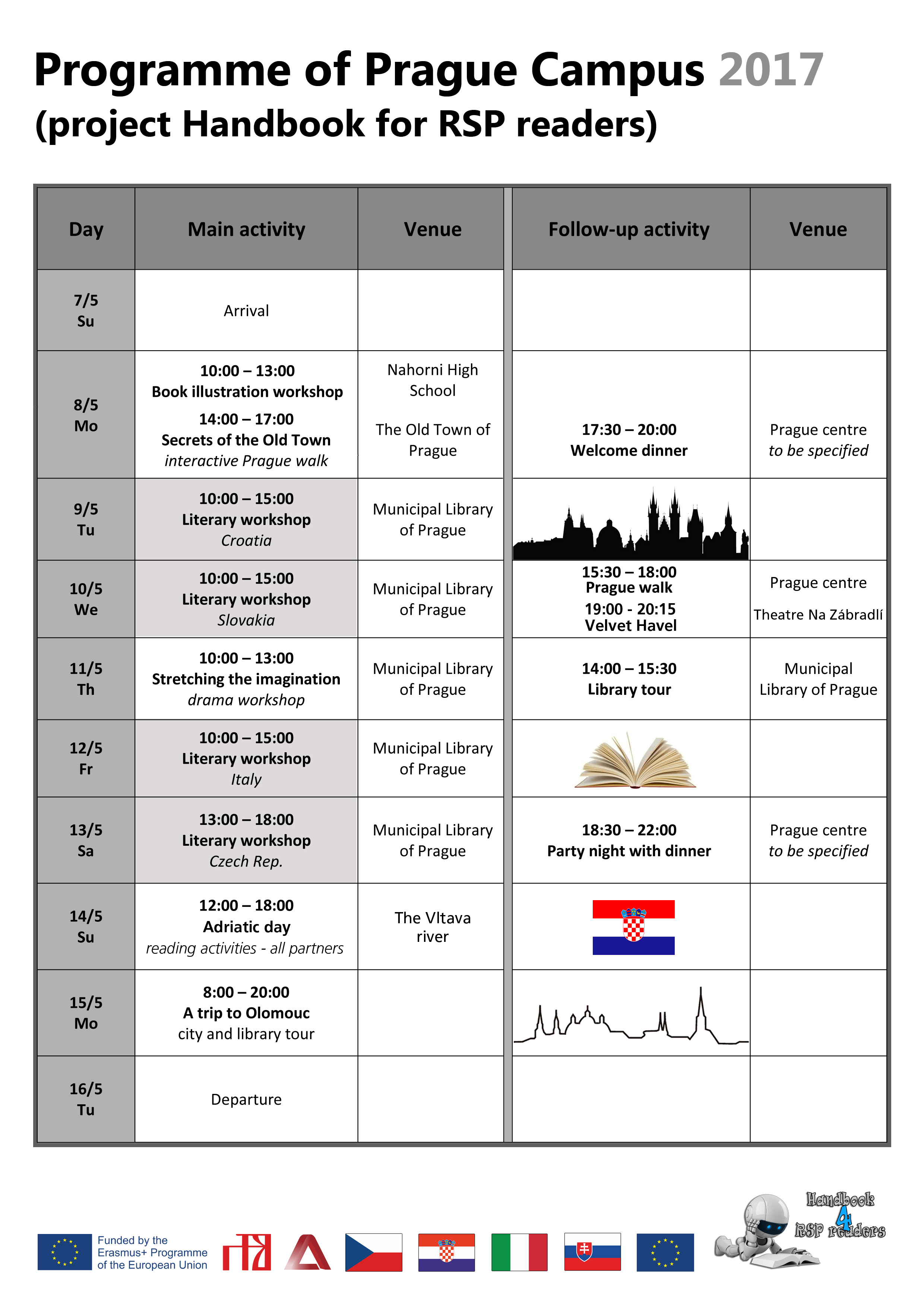 The Praha Campus took place from 7th to 16th May 2017. Partners selected 22 pupils age of 15 to 18 from Partners schools (5 students from Croatia, 5 students from Italy, 6 students from Slovakia and 6 students from Czech Republic). Selection of pupils also included pupils with the migrant background. Selection of implemented literature texts also corresponded in order to meet another main project objective adressing the migrant literary misconceptions.
The Praha Campus took place from 7th to 16th May 2017. Partners selected 22 pupils age of 15 to 18 from Partners schools (5 students from Croatia, 5 students from Italy, 6 students from Slovakia and 6 students from Czech Republic). Selection of pupils also included pupils with the migrant background. Selection of implemented literature texts also corresponded in order to meet another main project objective adressing the migrant literary misconceptions.
Accompanied with their mentors they worked closely on motivational stories selected for Praha-Campus.
After the arrival in Prague on 7th May, on May 8th the students and the teachers of 4 countries participating the project met at Náhorní High. Headmistress, Hana Pavelková, Pavlína Vočková, school Erasmus+ coordinator and Jan Pytel, Náhorní High School teacher and witter welcommed us warmly and took us for a school tour.
Partners representatives held a Meeting where they discussed, in details, the activities that will take place during Praha–Campus in forthcomming period as well as Project Management issues, deadlines for Intelectual outputs (O2.A1) and reports, field work (O2.A2) etc.
Meanwhile, the students attended guided Book illustration workshop at one of the school clasrooms. Students discussed their most significant national writers and their contributions to the national literature
They choosed one writer and created visual presentation of their life, opinions, work of art etc.
Afternoon was reserved for an interactive sightseeing tour Secrets of the Old town where the students worked in groups and according to different clues they had to find certain historical places in the centre of Prague. The students and the teachers together enjoyed the activity as they learned a lot about the history of Prague.
9th May was dedicated to the first workshop carried out by the Croatian Team. Two activities were conducted. The first one, called ProseCourt was connected to the F. S. Fitzgeralds novel The Great Gatsby. After watching the final movie scene the students task was to reflect at possibility who the Gatsby´s murderer is. By working on excerpts from the book (pg. 37, 132-143) the students were investigating The Case. Every group was to read an extract from the novel related to one of the characters. They had to decide and justify their decisions in front of a group of judges. Dynamic discussion took place and students were bringing out their arguments on responsability of their characters. Finally, the judges brought out opinion of responsibility on each part in possible conflict situation. The activity was interesting and well structured. As a final result the students were changing the tragic ending by changing the behaviour of given characters from the novel. This opened a possibility for them to rewrite the novel's ending (who done it?).
As the real murderer was not revealed, the students were tempted to read the integral story.
The Hero's Journey was dedicated to creation of a fantasy story. The students were presented with the concept/scheme of canonic fantasy story such The Lord of the Rings is. By following the elements of structure analyses (5 steps cycle) students created their own fantasy stories. At the end, every group presented their stories to the others, reading them outloud. The aim of this part of the activity was for students to, by using the circular story structure and their awakened creativity potentials manage to create their own, unique fantasy story.
Within second part of this activity students were working on excerpt from The Lord of the Rings (LOTR V, The return of the King (Ch.10). By using Plot structure diagram they had to find some standard feature elements of fantasy story by determining: event, settings of the fantasy world, main characters according to their standard high fantasy features, the key conflict. The students task was also to describe and distribute 5 stages of the dramatic action in the Plot structure diagram line (Conflict, Rising action, Turning point, Falling action, Resolution).
The aim of this task was for students to apply previously gained knowledge from the first part of the activity by managing to define fantasy story elements and structure of a plot on proposed text extract. When finished, the groups representatives reported on results.
At the end of Croatian workshop an excellent documentary movie (part of Erasmus+ project Lighthouses and Stations: Trip to Ithaca - Crab's children; (https://www.youtube.com/watch?v=K3mf6TClV-k) was offered to the students. The movie addressed relevant social and migration issues created on experiences of migration.
The activities affected students mostly on their ability for: public performance, reading fluency and accuracy, building-up their reading and writing imagination and enthusiasm, expressing emotions, building up their self-confidence, getting in to the story (beeing absorbed by it), activating and changing the reader´s point of view while reading (aesthetic reading), identifying with the characters, emphaty, argumenting, analyses, critical reading and reflection; creating and using communicative contexts for reading activities.
The activities allowed them to interact, be creative and ultimately grasp key concepts from the motivational texts. They also enabled students to exercise their autonomy and their ability to think with ultimate impact on the development of their self-regulative capacities by involving them in texts (one of the main project objectives).
By observing the weaknesses of Croatian workshop we noticed that, although the activities were highly motivational, for many students they were demanding. For purposes of final proposal and implementation (O2.A1) the activites should be adjusted and simplified with a shorter story extracts in order to keep the students motivation on higher level.
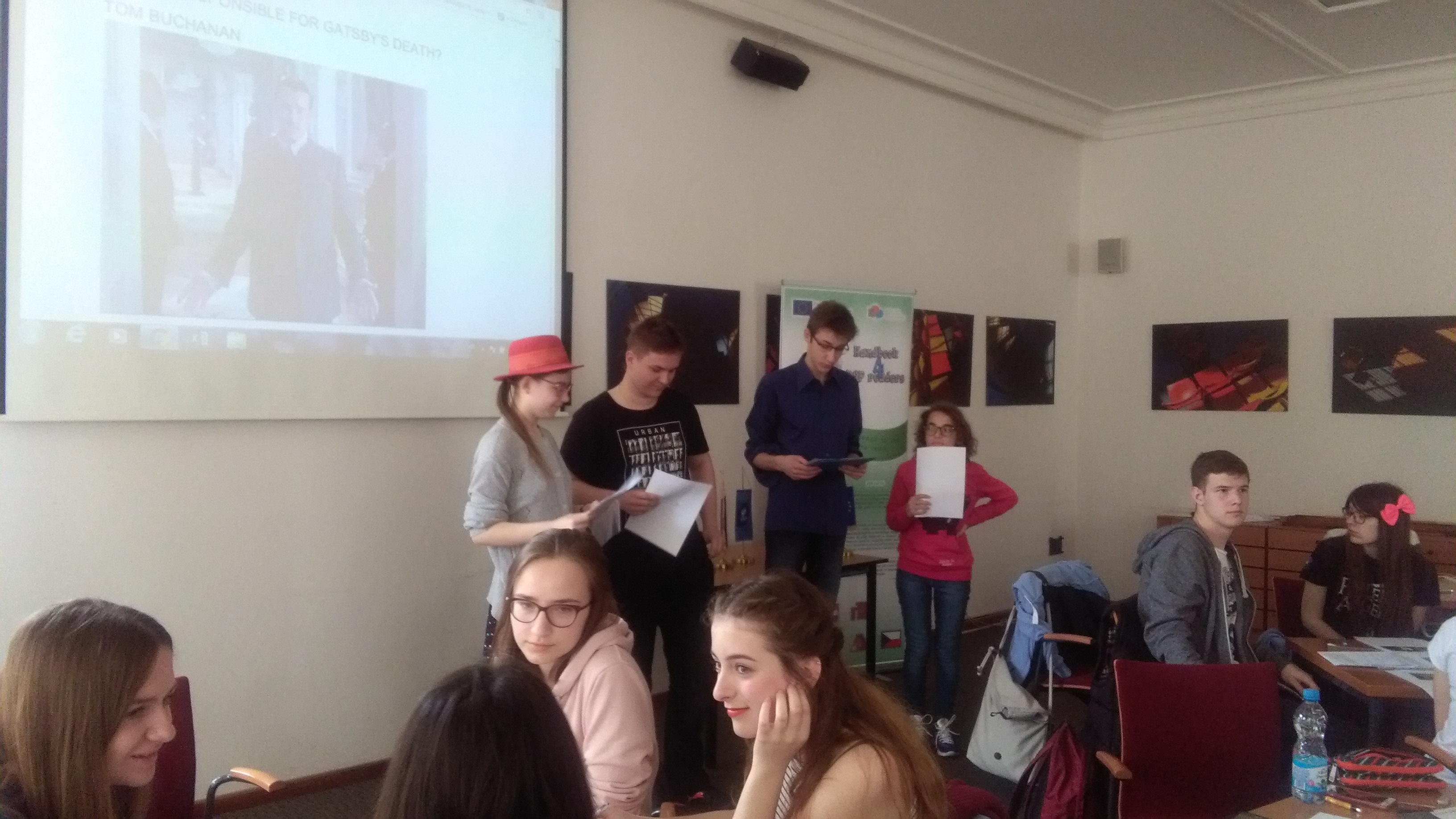

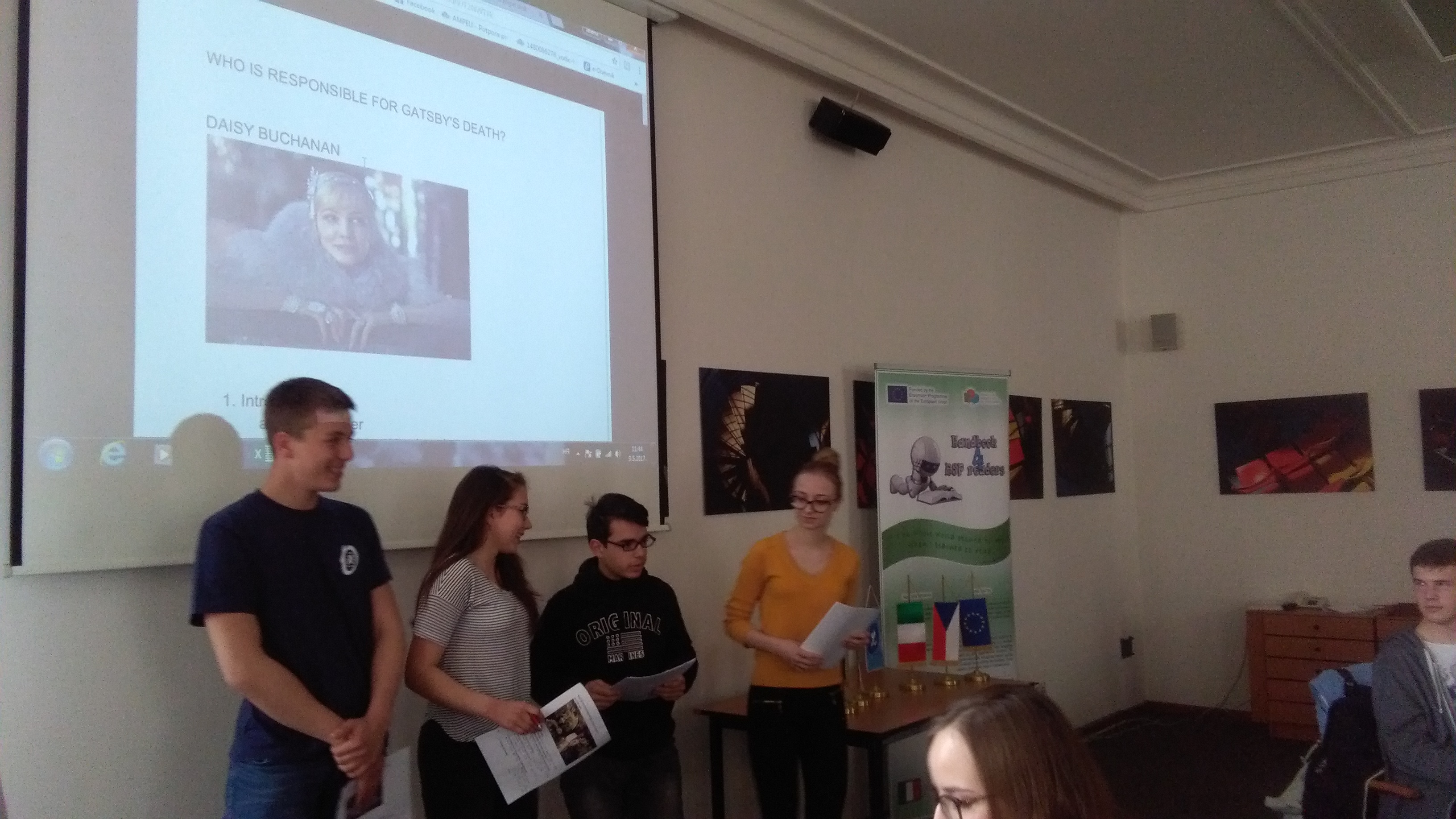
Slovakia Team carried out their activities on 10th May. The first activity tried out was called The book code. The aim of the activity was to find a certain book in the library according to some clues which had to be found in different books. The students were supposed to read certain parts of different books to find the clues. During this activity students were encouraged to learn how to find books in a library; they had to read some parts in different books. The students held the chosen books in their hands so we think that they might find them interesting and there is a possibility that they will read some of them in the future. Following activity was called I´ll give you the sun and the students had to e.g. create the internal monologue of the main characters. These activities were intended to make the books interesting for students. As there were a lot of groups, it took more time to compete for the students. So it is better to have only two – three groups.
The next activity carried out along with the first one was called Pantomime a story. In this activity the aim was to teach students to find the important ideas of the story which they could use to pantomime it. Each group was given an excerpt of the story they read it acted it out and recorded it. After that they had to put the storyline together. The students liked the activity, they cooperated and after they had put the story together they were encouraged to retell the story. This activity can be adapted to different books or stories and as the students had to record the pantomimes it was possible to re-watch it again. But the pantomime can be performed directly.
The third activity was connected with the story by Isaac Asimov, The fun they had. The task of the students was to read the story and to replace the main character from the future to the present. The students had to create a comic about the main character attending contemporary schools. They had to cooperate and justify their decisions. In this activity they had to use their imagination but as well creativity while drawing. They had to understand the text to be able to place the character into the present.
All the activities helped the students to improve their reading literacy, encourage them to read and decide which books might be interesting for them.
In the evening students and teachers visited Divadlo Na zábradlí's performance called Velvet Havel (engl. subtitles). The performance deals with theme of one of the most significant Czech characters, Václav Havel. It is an authorial music theatre project of Miloš Orson Štědroň inspired by Havel’s life and work and his surroundings with his authentic humour.
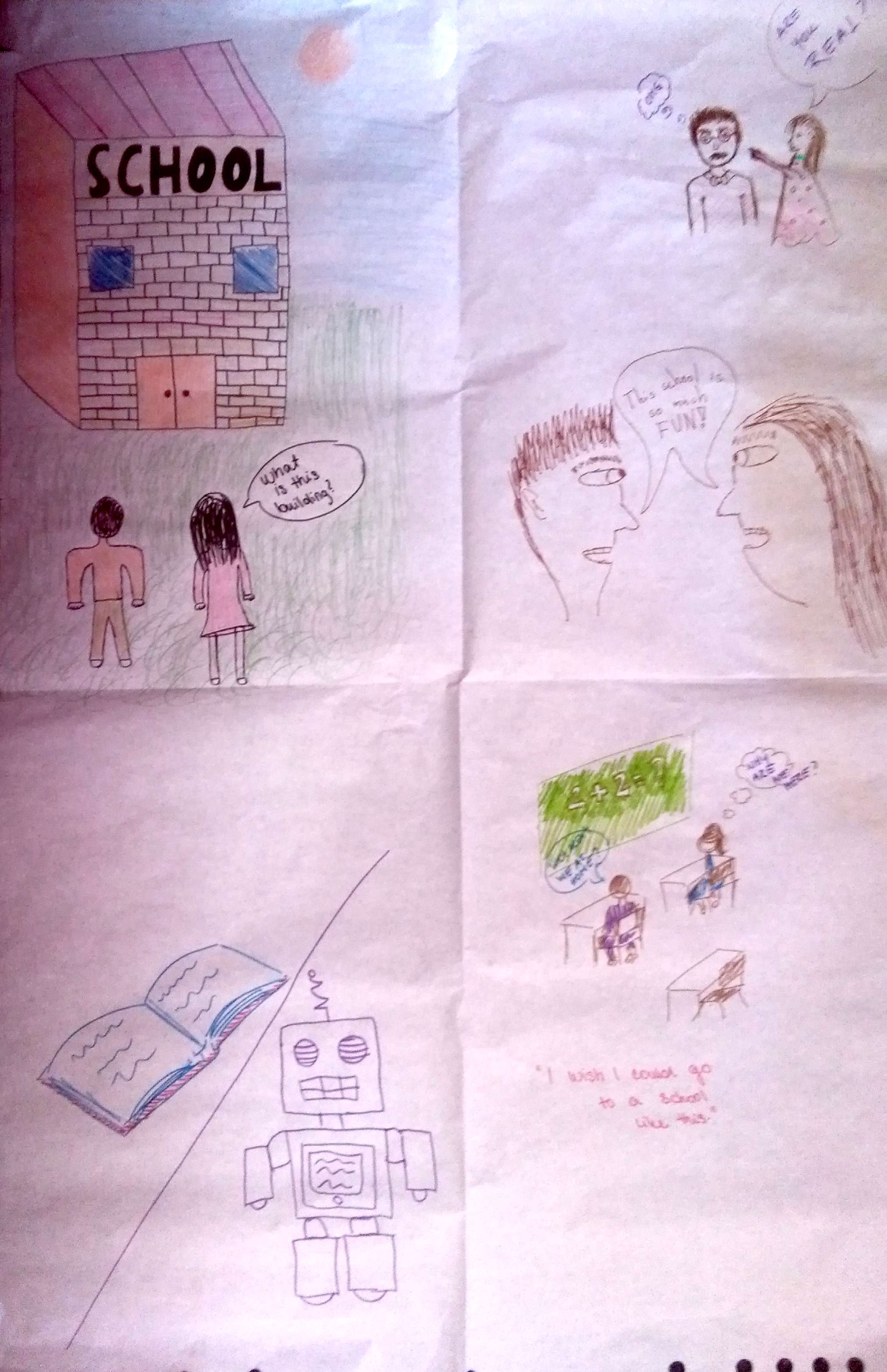
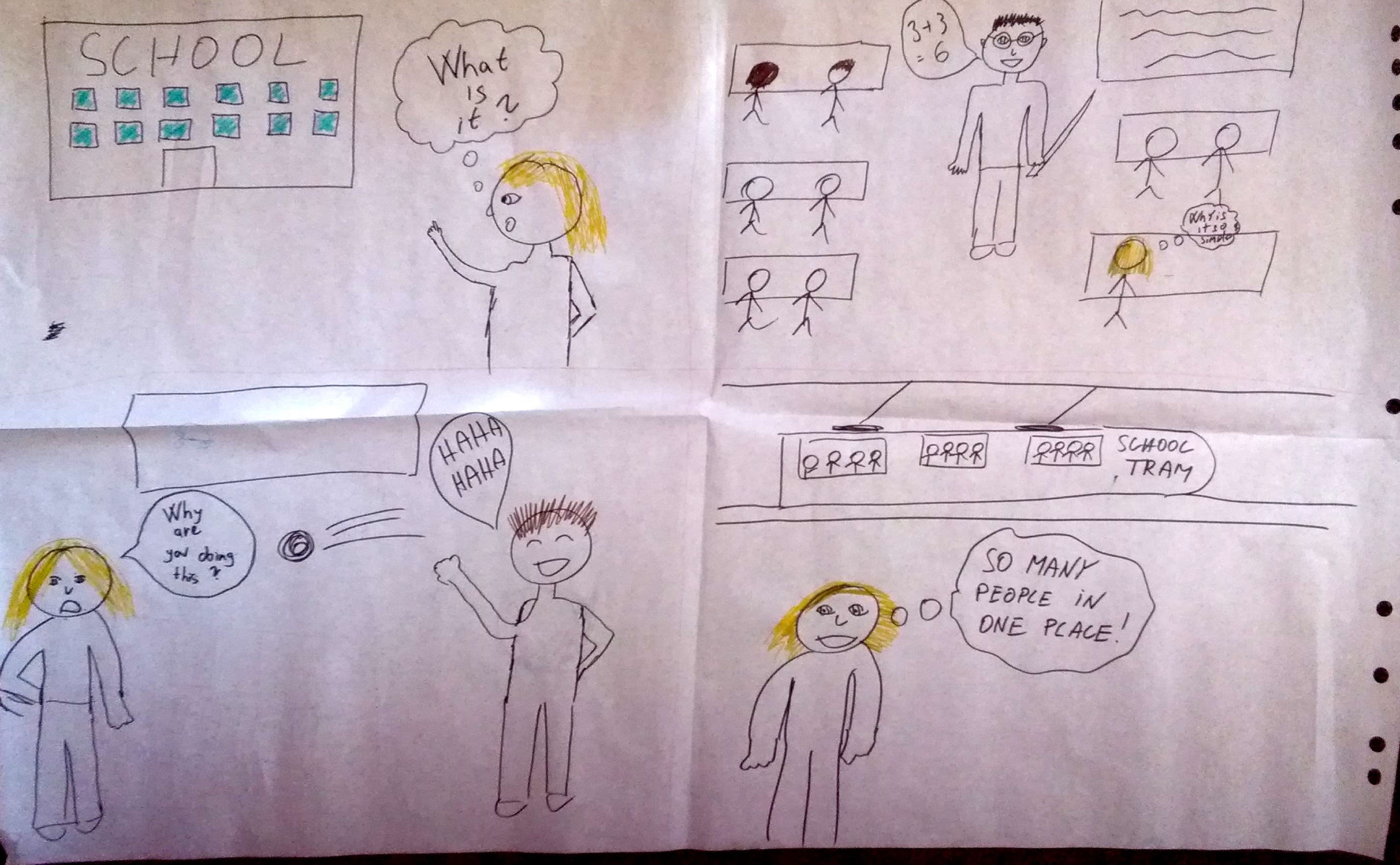
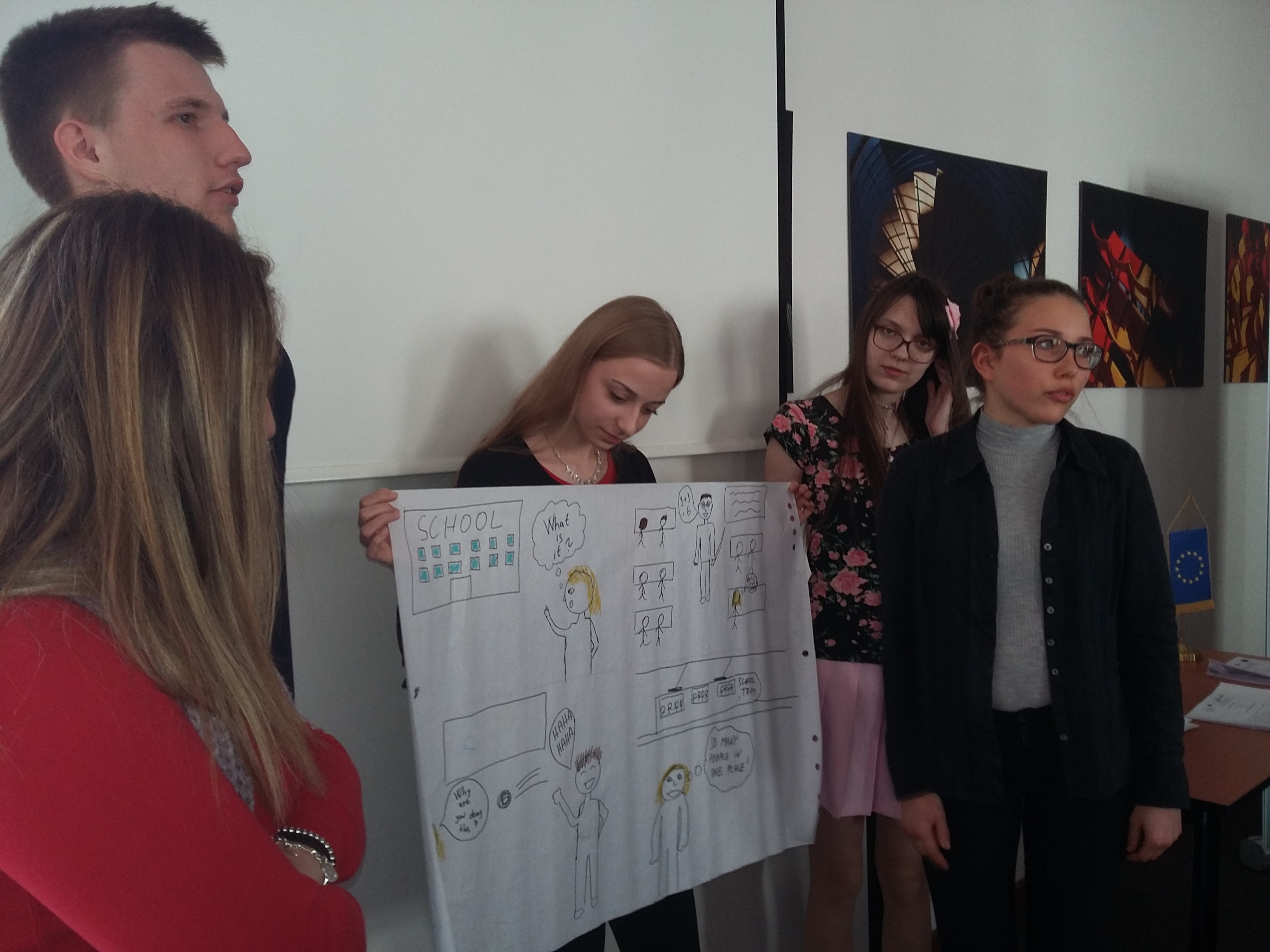
11th May was dedicated to the Drama workshop carried out by Mr. Jan Pytel, Náhorní High School teacher and witter. The activity was based on Pytel's tekst, Departures based on migranion issues. It was highly appreciated by students because they could relax a bit after two demanding days.
During the early afternoon students and teachers attended guided Library tour. They were presented with insight of Municipal Library of Prague. All Partners workshops (5) were carried out in the Library. The chossen venue was very stimulating place for students so the enlightment atmosphere also encouraged them to read.
Italian Team pursued their activities on 12th May. Following the Italian guidelines (learning by doing, gaining the pleasure of reading while reading, gamification- learning by playing) the activities can be summed up as following:
Bums on the outside, libraries inside was a memory game. After reading a passage from Fahrenheit 451 (Ray Bradbury), students were encouraged to memorise a few lines and words from the text and recite them. Therefore, every student had the great opportunity to turn into a member of the so-called book people ( like the characters of the novel), thus experiencing the evocative power of words . This workshop aims at placing emphasis on the text and its linguistic assonances, by linking them to the themes of freedom and democracy. The activity of memorisation contributes to preserving the skills of attention and accuracy jeopardised by the uncontrolled and widespread use of the modern media.
After reading the short stories Sentry and Pattern (Frederic Brown), students were asked to create "imaginary, impossible interviews" with aliens. This activity draws inspiration from the technique of "estrangement" which dates back to Swift's Gulliver's Travels and Montesquieu's Persian Letters in order to enable students to apply their creativity to the contemporary world / reality.
So many faces in a story - While considering The diaries of Adam and Eve (Mark Twain), three cubes, bearing several tasks on their sides (i.e. “draw a comic imagining a dialogue between Adam and Eve”), were devised and handed to the students. They were invited to throw the dice and perform the task shown on the upright side of it. Starting from a text, such an activity develops the skill of deconstructing the narration in order to encourage alternative personal narrations. The enjoyment of playing a game free from any competition favours group work and the pleasure of reading.
Reading for fun - a game based on the reading of a text . Students were asked to read a text Hansel and Gretel and join an entertaining competition based on questions about the text and its author . "The gamification of learning is an educational approach to motivate students to learn by using game elements in learning environments. The goal is to maximize enjoyment and engagement through capturing the interest of learners and inspiring them to continue learning" (wikipedia).
Carried activities enabled students to rediscovered the power of memory, unleashed their imagination and creativity, different roles made them reflect upon different perspectives. While playing, they carried out enjoyable, entertaining and stimulating group activities involving different skills (audio-visual, kinetic and graphic). They also had the chance to develop communication and cooperation skills and had lots of fun while playing the games related to literary texsts.
By observing the weaknesses of this workshop it is noticed that: some students found it difficult to memorise even the few lines they were assigned to learn by heart; they were too shy and felt embarassed to speak-up in front of their peers and teachers; they found it difficult to make up questions to ask the characters of a short story; some students, driven by excessive competitiveness, felt disappointed.
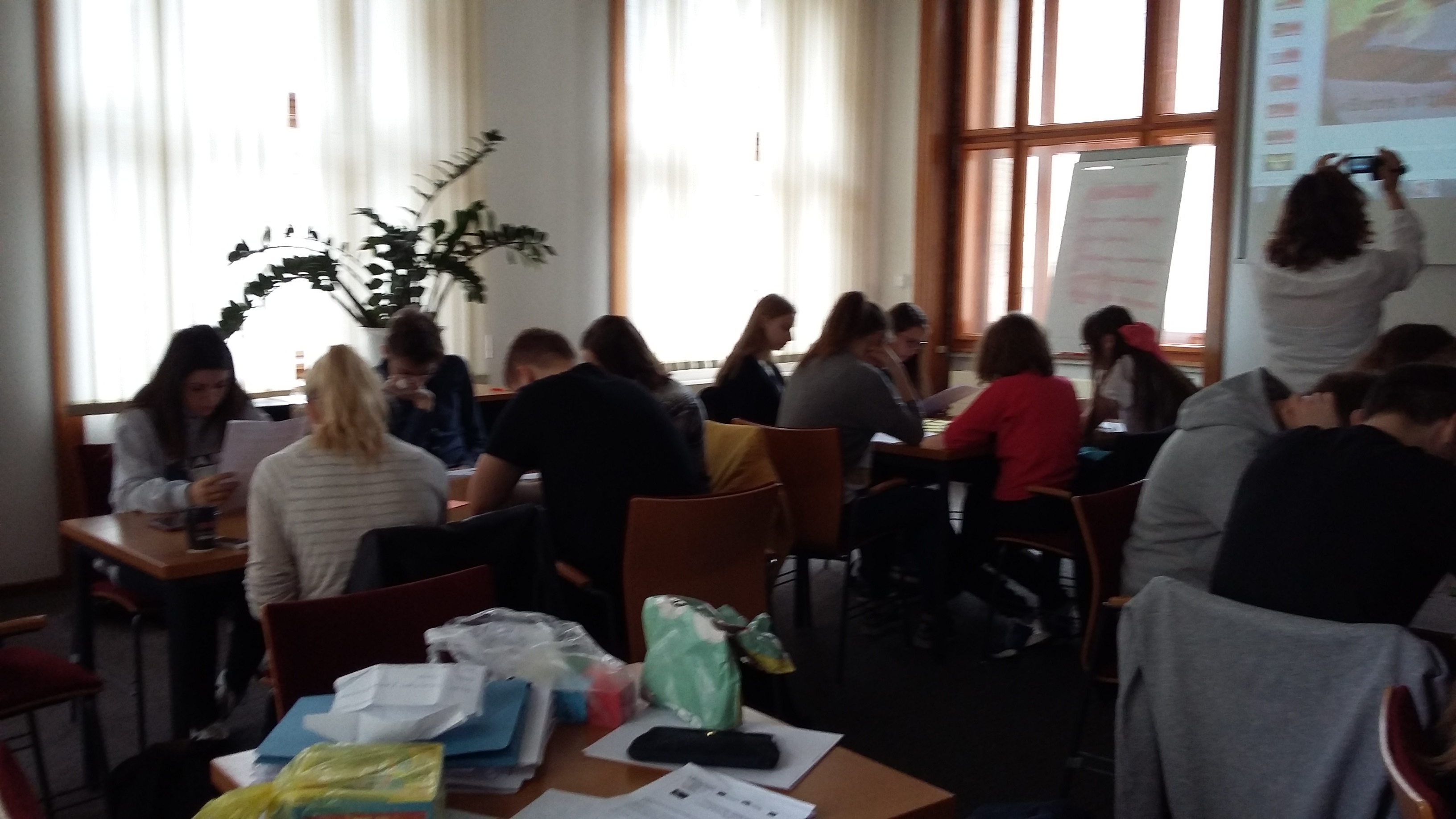
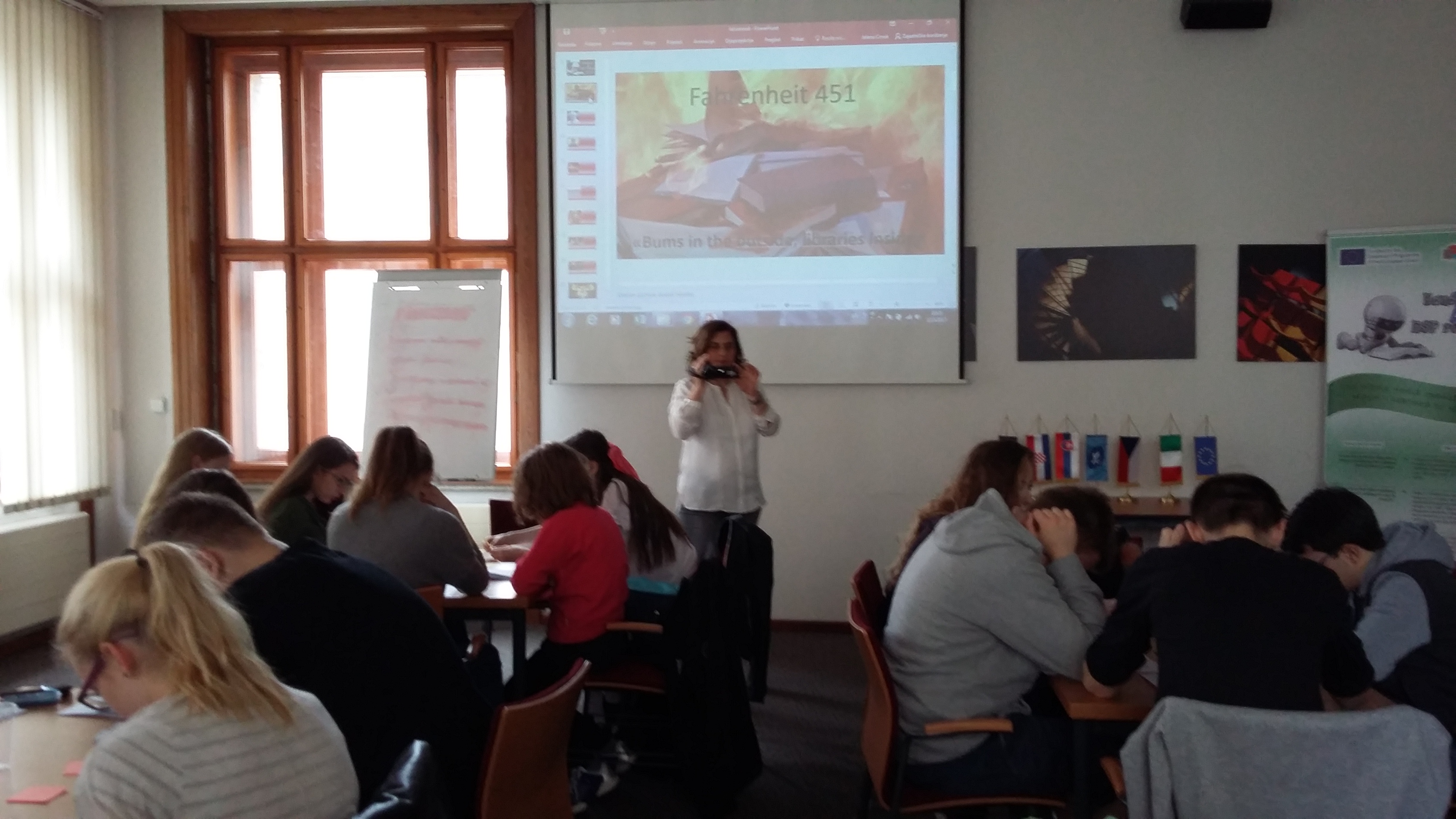
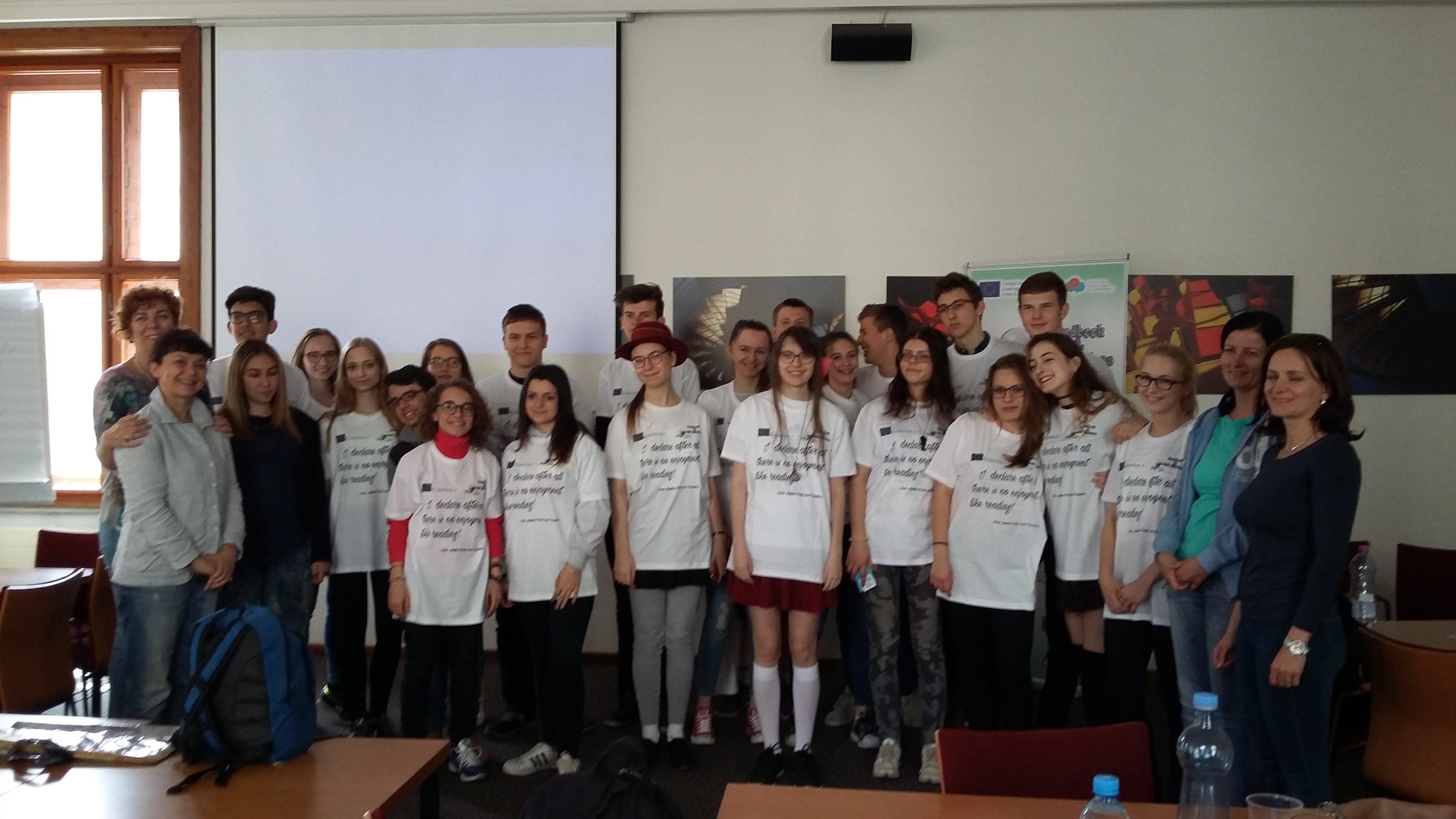
On Saturday 13th May the Czech Team carried out their activities. They started the workshop with short story The Redhead (Daniil Kharms, 1920). The focus was on the theme of personality and importance of every single person for himself/herself and other people. The students worked in groups of 5 and they were forced to discuss their ideas a lot within their groups and then to compare them with the other groups. Simple art activity helped the participants to find a creative approach and it supported a very interesting discussion.
The other two stories, One Entry Per Person and Of the Waves and Men came with the author himself. Tom Hadrava prepared his own lesson plans and carry them out with the students at the workshop. Although the lesson plans were evaluated positively, recommendation is to involve more supporting activities (e.g. art ones) which would support the students’ imagination and guide them through their contemplations over the different shapes of waves etc. It could also be useful to use more group work as it would force the participants to come with more active approach.
The last story performed in the workshop, Departures (used as the core part of the Drama workshop the other day). A very simple text with deep stories in the background focused on making hard decisions forces the reader to work deeply with his/her fantasy. Students collaborated in groups a lot and had to create living pictures and diary entries – their own short texts. They also improvised dialogues and dealt with various characters in different situations. As the questionnaires proved, this activity belonged among the most popular ones. The text was very short and simple and the lesson plan involved a wide range of activities based on the students’ imagination and creativity which are skills that on the one hand are natural for children and young people, however, they are often omitted and cut during school education.
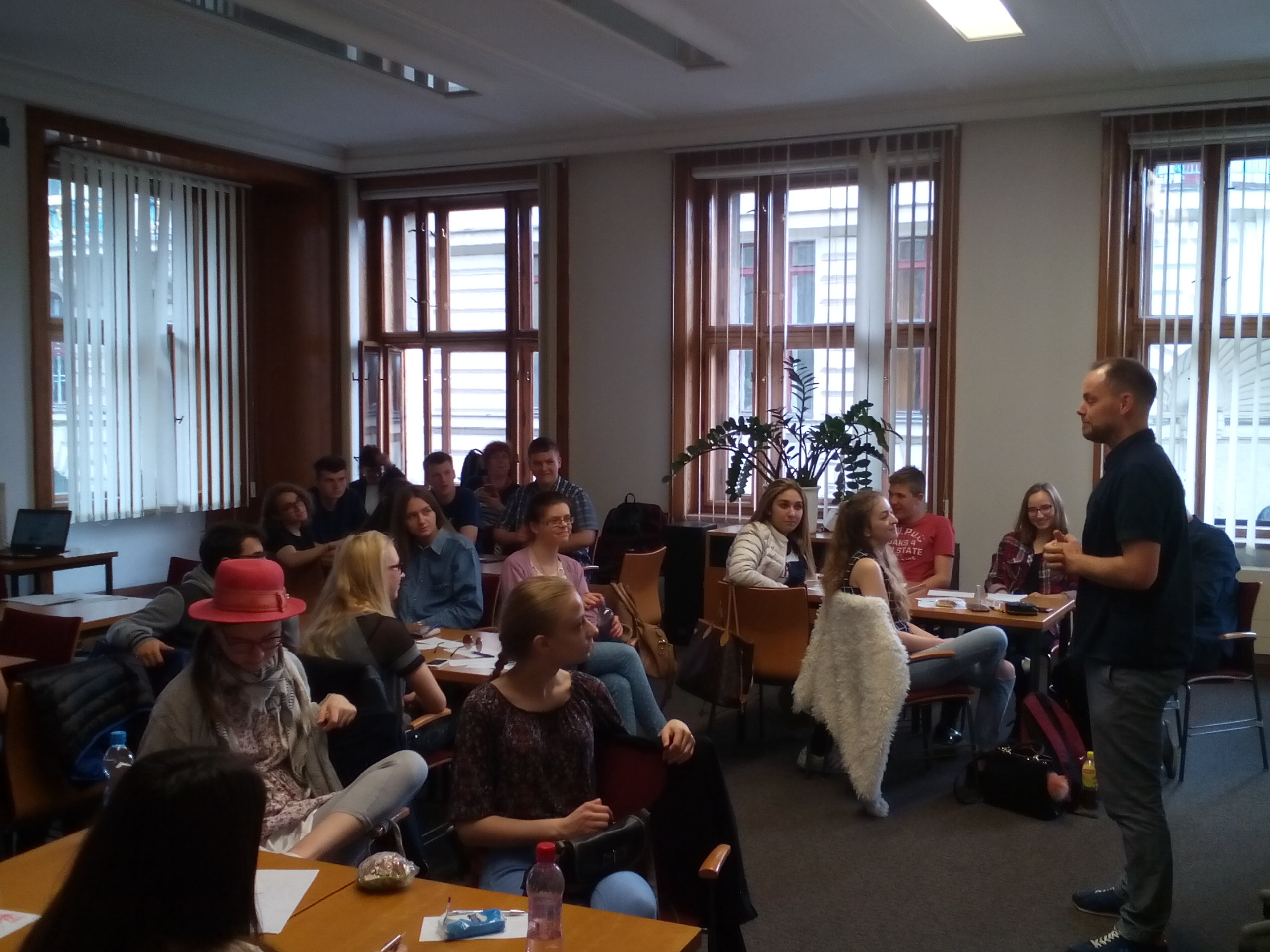
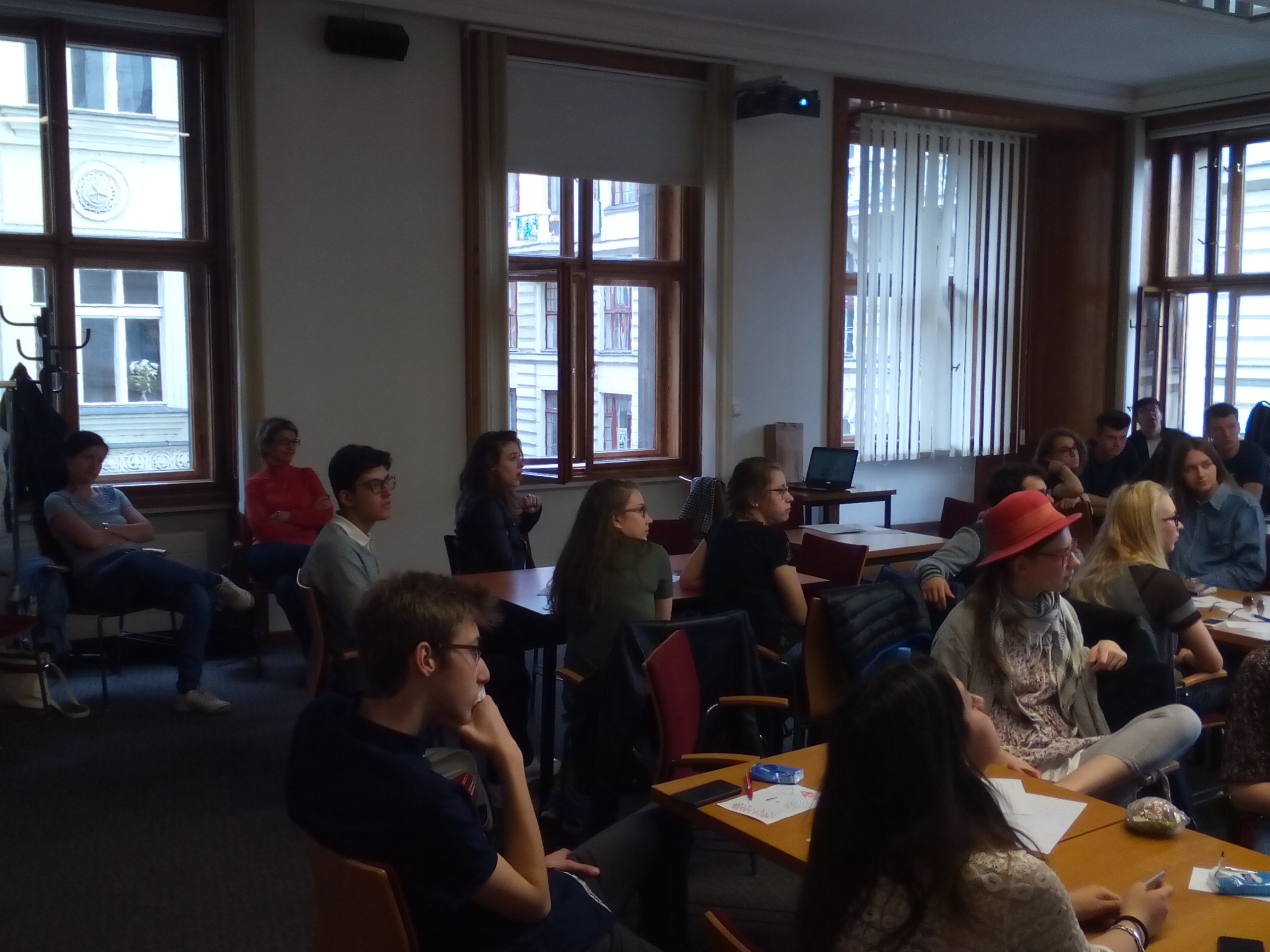
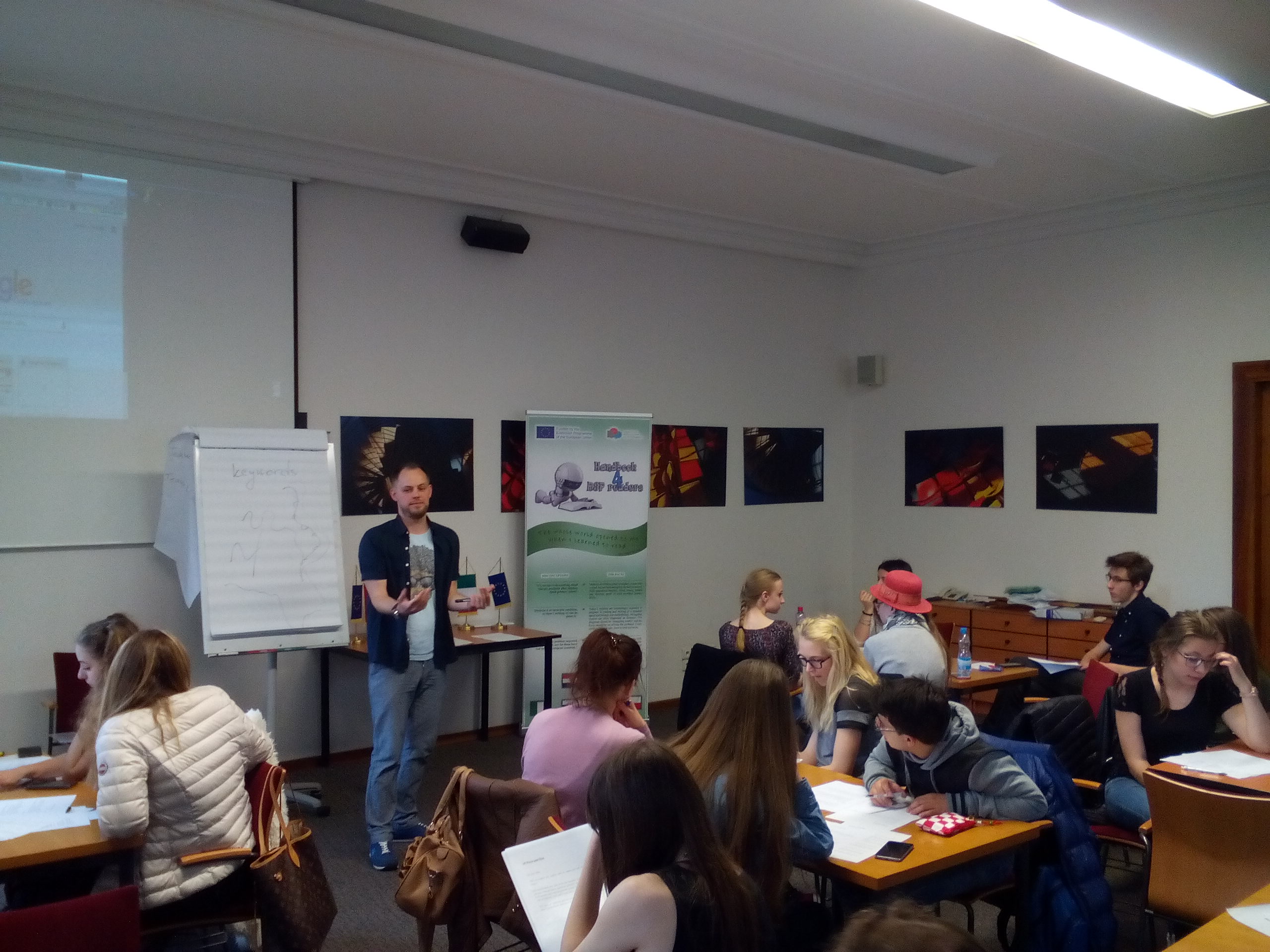
Class management of all activities was organized by division of students in to smaller groups (5x4 or 4x5). Student were mixed by nationalities and there was a mentor contributing each group, helping them out with their tasks and possible language barriers. The mentor was also observing the students, following their progress and possible obstacles.
On Sunday 14th May students and their mentors attended Adriatic day which was dedicated to the outdoor reading activites and the culture of Croatia. Students (one from each partner country) performed a poem typical for his country. They were reading uploud on their national languages feeling higly motivated and confident in their performances.
Croatian Embassy in Prague invited our Erasumus+ project to be a part of Adriatic day event. The students learned about the culture, music and food of Croatia. They seized the opportunity and took a ride on traditional Croatian boat called Falkuša touring on river Vltava. While they were driving on Falkuša they listen to an excellent performance of Croatian song Barbara (Ivan Slamnig) by Croatian student Roko Parlov. At this occasion students also contributed another European project (organized by Udruga Palagruža from Croatian island Vis) and took part in process of building parts of boat called komiška gundula.
On Monday 15th May group visited the Library in Olomouc (https://www.vkol.cz/en/) where the students and their mentors enyojed gudied tour by Headlibrarian. For this occasion she prepared extensive lecture on history and importance of Olomouc Library. She also informed the students and their mentors about the structure and organisation of the Library.
During the Olomouc visit Follow up Partner's Meeting took place.
Each Partner revised the elements, strength and weakness of their own workshop and highlighted possible changes to the existing and future activities needed for successful finalization of O2. Handbok for RSP readers outcome.
Partners agreed that the main purpose of LA activity – Campus Praha was achieved because they were able to test their proposed metodologies in real situations with group of students from partner countries getting an immediate response and feedback from students, considering their participation and involvement. Campus Praha helped in clearing out the path and directed future work towards avoiding possible misspoints in finalizing methodology for O2 Handbook for RSP readers project outcome.
Conclusions were made as follows:
- Every partner pointed out the importance of nature of future methodology in light of its purpose which primarily has to be focused on motivation of RSP readers.
- By rearanging existing and developing the future motivational activities related to the chosen stories (40), partners will ensure their methodology choices to be appropriate for target group of RSP students, from 15-18 years old.
- Partners will try to avoid read and comprehension strategies at the beginning of their methodology units
- Recommendation is to involve more supporting activities (e.g. art ones) which would support the students’ imagination
- Lexical approach should be carefully represented in order to avoid this approach to become the main purpose of the methodological units.
- Achieving the RSP students motivation through inventive motivational activities at the beginning of the lessons; focusing them at understanding of general theme and content of the proposed stories; leading them to become self sufficient readers and learners should finally be the main goal of the proposed O2 activities. From this point they can start building up their self-confidence, proven to be one of their main obstacle. This methodology approach has final result in raising RSP readers self-confidence as it is pointed out in project proposal (pg. 3, 28, 50).
The activities conducted during the Campus helped partners to focus to the aim of the project better. They piloted methodology they've suggested for their choosen stories on the spot, with RSP readers students. Also, were able to discuss the strengths and weaknesses of the activities and adjust and rework them. The partners were as well motivated by each other works.
We left Prague on 16th May.
WORKSHOPS RESULTS and CONCLUSIONS
During the Praha-Campus (May, 7-16th 2017) Partners implemented motivational activities, best practices and methods in order to define most efficient ways to successful promotion of reading with selected RSP readers students. Changing the self-concept of RSP readers by involving them in texts was the main goal of these activities. In order to achieve the project objectives and meet RSP reader's interest the Partners proposed several appealing text materials selected from proposed corpus consisting 40 stories. Through proposed methodology of the metacognitive approach and reading comprehension strategies, built in motivational and reading activities, the students were presented with the tools for the comprehension and study of written texts. Implemented activities allowed RSP readers students to interact, be creative and ultimately grasp key concepts from the motivational texts. They also enabled students to exercise their authonomy and their ability to think with ultimate impact on the development of their self-regulative capacities by involving them in texts. The students were encouraged by processes of comprehension and responding to the texts content (effective reading) which allowed them to understand the message and elaborate their personal answers and points of view in collaboration with their peers and teachers. Special emphasis was put on the aspect of reading for pleasure as the unavoidable factor of motivation. By applying inventive strategies during these activities, the Praha Campus students reading become more conscious and strategic.
The activities affected students mostly on their ability for/to: public performance, reading fluency and accuracy, knowledge transfer, artistic expression, organizational skills and team work, argumenting, analyses, critical reading and reflection, expressing emotions, activating and changing the reader´s point of view, aesthetic reading, identifying with the characters while building-up their: self-confidence, emphaty, reading and writing imagination and enthusiasm, communication and cooperation skills and ability to create communicative contexts for future reading activities. They rediscovered the power of memory, unleashed their imagination, creativity and artistic potentials and the different roles made them reflect upon different perspectives. Throught stimulating group activities they also played while developing different skills (audio-visual, kinetic and graphic). Implemented activities resulted with a positive impact on reading motivation by enabling the students to exercise their autonomy and their ability to think with ultimate impact on the development of their self-regulative capacities.
Series of surveys were conducted during the Activity with teachers and students. In the Initial Questionnaires students stated that they are keen to read (72% of respondents stated they enjoy reading intensively, while the other 28%, moderately). They also think that changes in the school curriculum and teaching approaches may increase their interest in reading (63%). Even though these students love to read, 75% of them claim they have difficulty identifying with book characters, 77% have difficulty reading in front of the class and 68% of participants do not feel comfortable expressing their opinion about a book.
Direct impact on Praha-Campus RSP readers students can be observed through the results of the Survey. After the Initial and Final Questionnaires comparison, as well as from the analyzed Workshops Questionnaires the results showed that implemented activities had positive impact on RSP readers students. Amoung other conclusions it can be pointed-out as follows:
- 86% of students have better motivation for reading than at the beginning of the activities
- Student's confidence to read in front of the group has increased by 40%
- Student's identification with book characters increased by 11%
- Student's confidence for expressing opinions increased by 14%.
Through 7 Workshops (16 activities) conducted in nine days students created following materials:
|
Partner |
Name of the Activity/Workshop |
Number of collected materials |
|
Střední škola Náhorní (3 workshops) |
Book illustration workshop |
4 posters/book covers presenting national authors |
|
The readhead |
15 diagrams 6 worksheets |
|
|
Of waves and man |
2 worksheets |
|
|
One entry per person |
22 drawings |
|
|
Streching the imagination workshop |
Video and photo materials |
|
|
Liceo Scientifico Statale Seguenza
|
Memory game: Bums on the outside, libraries inside |
2 worksheets |
|
Impossible interview |
1 drawing 9 worksheets |
|
|
So many faces in one story-Cubing |
6 drawings 8 worksheets |
|
|
Reading for fun |
/ |
|
|
X. gimnazija “Ivan Supek” |
Prose court |
22 worksheets |
|
Fantasy |
17 diagrams 13 worksheets |
|
|
The hero's journey |
3 drawings 3 worksheets |
|
|
Gymnázium Pavla Jozefa Šafárika
|
Book code |
15 worksheets |
|
Pantomime a story |
8 worksheets |
|
|
I'll give you the sun |
24 worksheets |
|
|
Adriatic day – ALL PARTNERS |
Outdor reading activities |
Video materials |
Implemented Praha-Campus activities and results are to become an integral part of O2 - Handbook for RSP readerds outcome. They will also take part in pilot phase (O3.A3 Pilot – testing the Curriculum and training material) of the Project when fine adjustments of the Handbook products together with new Curriculum will be conducted.
http://handbook4rspreaders.org/
This publication reflects the views only of the author, and the Commission can not be held responsible for any use which may be made of the information contained therei
The big international surveys of the last decades have left the impression that educational reforms are above all about increasing the achievement level of students, and that all that counts are the accomplishments measurable in standardized large scale assessments. Many reforms currently define educational “standards” and “competences” as measurable “output” of instruction without giving sufficient support to teachers, headpersons and educational administrations concerning the required “input”. The contribution to this “input” is clearly the main interest of this project and its Curricula for RSP readers.
Unfortunately, the students we describe as reluctant, struggling and poor often remain outside the programs and curricula. There is no systematic continuing reading training in the context of content area instruction, beyond the first two class-levels. Therefore, adolescents struggling with reading do not find any support; their subject-specific learning potentials and interests cannot unfold because of comprehension problems. Consequently, their performance is poor. With these deficits, they are cut off from higher educational qualifications and correspondingly from the better jobs. There is a deplorable discrepancy in this area between the urgency of the problem and the absence of concepts. Society leaves a lot of educational potential unused.
We have asked: What are the components of good practice that teachers would use to support and develop readership skills with RSP readers?
A significant number of students read below grade level because they lack the ability to apply comprehension strategies in order to create meaning. This inability is exacerbated by a pattern of teaching in many secondary classrooms that circumvents the lack of students’ comprehension through an “assigning and telling” model of instruction: teachers assign outside reading, then lecture on the content the next day (Smith and Feathers, 1983; Thomas, 1993). As a result, students implicitly learn that the content of the reading assignments they failed to complete will be explained in class, lessening their need to utilize their nascent comprehension skills.
Traditional instruction in Partners countries is sequentially organized and centred on the teacher: Instruction starts with the determination of learning targets and achievement requirements by the teacher, which is based on external specifications (Curricula, educational standards). The choice of materials and methods, the realization of the lessons and the final performance tests all refer back to this definition of learning targets. The tests compare individual performance with previously defined requirements and leads to a ranking of the students (summative assessments). To organize instruction in this way is natural for schools and educational systems which have the primary goal of transmitting contents (learning of / curricula centred on contents) and which demand the mastery of these contents for granting success to the students (performance orientated systems).
In many cases, the usual instruction only transmits subject-specific contents (learning of / knowing what) and complies with externally defined aims and assessments. This no longer conforms to the state of the art. The surge of tests in the wake of PISA has even exacerbated the problem. To prove to a poor student how poor his performance is in comparison to others, at worst confirms his already problematic self-concept and gives him little chance to improve. An evidence-based instruction, on the contrary, should aim at transmitting competences for learning subject area contents and determining student-competences (learning for / knowing how).
Misconceptions
There are three misconceptions the Project Curricula are trying to fight against:
1. Today’s children are increasingly expected to progress in reading and writing at a standard speed and through one methodology. Struggling readers are often diagnosed as dyslexic. The diagnosis should be ‘struggling reader’ (Suchodoletz, W. Von, 2003) and the focus should be on solving the problem.
2. ‘It’s too late to do anything about literacy problems after children finish primary school.’ Millions of children enter secondary school able to read, but not well enough to do well in school. With specialised support, these young people can develop good, even excellent literacy skills.
3. Among others, the Curricula documents addresses one of the most recent literacy achievement gaps that Europe struggles with. Besides the socio-economic gap, the gender gap and the digital gap, overcoming the gap between migrants and native-born students is of most urgency.[1]
The vast majority of children and adults with poor literacy skills were born and raised in the country they live in, and speak its language of instruction as their mother tongue. Literacy has a growing migrant and multilingual dimension. It is estimated that by 2060, a third of the EU population will have at least one parent born outside the country they live in. Fully literate European migrants stand a much stronger chance of successfully adjusting to the culture and working conditions in destination countries or to embark on entrepreneurial ventures in new contexts.
Reflection on change in the national values concerning education, and national curricula in order to make them meet the RSP readers needs
National literature has a particular place in culture. Reading the national literature develops the relationship of children to the cultivated language, helps them express themselves in a refined way and develop the perception and use of symbolic meanings of the language. It is also important for them to connect with the home community, with its tradition, mentality, perceptions and values. It is an important condition for building a harmoniously balanced personality that can engage in the action of its community, but is equally capable of acting well in the broader cultural horizon.[2]
We are aware of the fact that national value orientations are reflected in the national curricula and in the organization of educational systems. There is an obvious connection between strongly selective educational systems and a paramount canonical orientation of national curricula. On contrary, the enhancement of the students’ personality puted at the centre of the educational philosophy and largely or completely abandonement the orientation towards the canonical reading material within the traditional “high literature” would bring serious prospects for RSP readers. The selectivity of the respective instruction is a nearly inavitable result of curricula which adhere to traditional literature.
In order to create the basis for a steady increase in success with RSP readers, established by the EU Reference Educational Standard, this document highlights the urgent need to change thinking and awareness among parents, teachers, specialists dealing with this issue, educational psychologists and educational decision makers. All interested parties should agree that NLP readers' needs must be carefully identified and adequate support is provided (EA DSNE, 2006).
CURRICULUM
Project Curriculum - Czech Republic
SYLLABUS
Remark
Bearing in mind the educational and cultural diversity in partners countries, Curricula with related Syllabus for each partner country are developed. During this process we recognized differences in educational contexts and relevant cultures and ensured practical value for all partner countries. Documents are available on the Project's website.
[1] ‘Low literacy is a problem imported by migrants, not for those born and bred in European countries.’ (HLGEL, 2012)
 Project Case Study
Project Case Study
Main components of the Case Study derive from two project activities (O1.A1 & O2.A2.) carried out from October 2016 to April 2018, as well as from the partners reports on Critical Review and State of the Art within their country.
Subcategories
Contact
X gimnazija ''Ivan Supek''
Ul. Vjekoslava Klaića 7
10000
Zagreb
E-mail: partners@handbook4rspreaders.org











